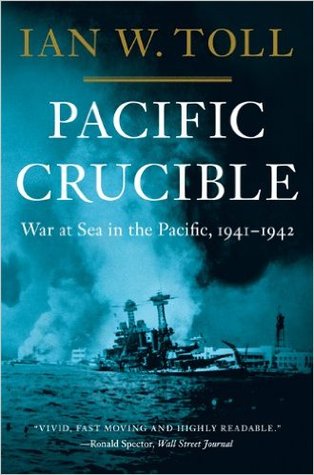More on this book
Community
Kindle Notes & Highlights
by
Ian W. Toll
Read between
March 24 - June 3, 2023
War is the tao of deception. Therefore, when planning an attack, feign inactivity. When near, appear as if you are far away. When far away, create the illusion that you are near. If the enemy is efficient, prepare for him. If he is strong, evade him. If he is angry, agitate him. If he is arrogant, behave timidly so as to encourage his arrogance. If he is rested, cause him to exert himself. Advance when he does not expect you. Attack him when he is unprepared. —Sun-Tzu, The Art of War
If the Second World War could be said to have pivoted on a single point, it was not the Battle of Britain, or El Alamein, or Stalingrad, or the fall of Italy. Pearl Harbor, by giving Roosevelt the license to do what needed to be done, sealed the fate of both Germany and Japan.
At a young age he was marked as an officer destined for high rank. He was respected for his powerful intellect and his close attention to technical details, and in naval policy debates he had a talent for persuading both peers and superiors with well-reasoned arguments that cut against the grain of conventional thinking.
As one officer put it, the Japanese had converted the American fleet from “a seventeen knot fleet to a twenty-five knot fleet.” Losing them on the opening day of the war forced the American naval high command to acknowledge the ascendancy of aviation and submarines. The Japanese navy, with its magnificent line of battleships intact, would be slow to make the same adjustment.
In his dealings with others, even superior officers who could have damaged his career prospects, King was inclined to behave with haughtiness and contempt. He did not pay court to officers he did not respect; he did not strive to be liked by anyone, even for tactical reasons. He went through life with the attitude of a man beleaguered on every side by dunces. In his insistence on high standards, even from men above him in the chain of command, he sometimes walked up to the edge of insolence or insubordination. He revealed his integrity through his supercilious refusal to play politics when a
...more
cryptanalysis was always a manic-depressive business. . . . Each man feared in his bones that we would never again succeed in the long and difficult task of breaking a new code.”
I have given a great deal of thought to the Rochefort affair,” Tom Dyer later wrote, “and I have been unwillingly forced to the conclusion that Rochefort committed the one unforgivable sin. To certain individuals of small mind and overweening ambition, there is no greater insult than to be proved wrong.”


